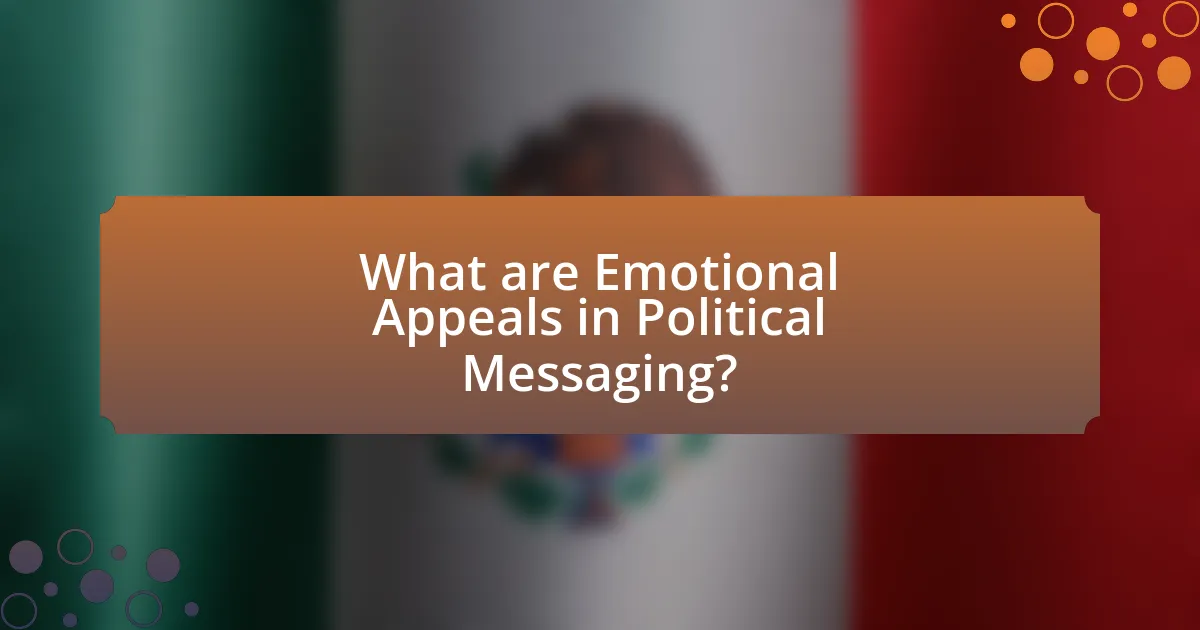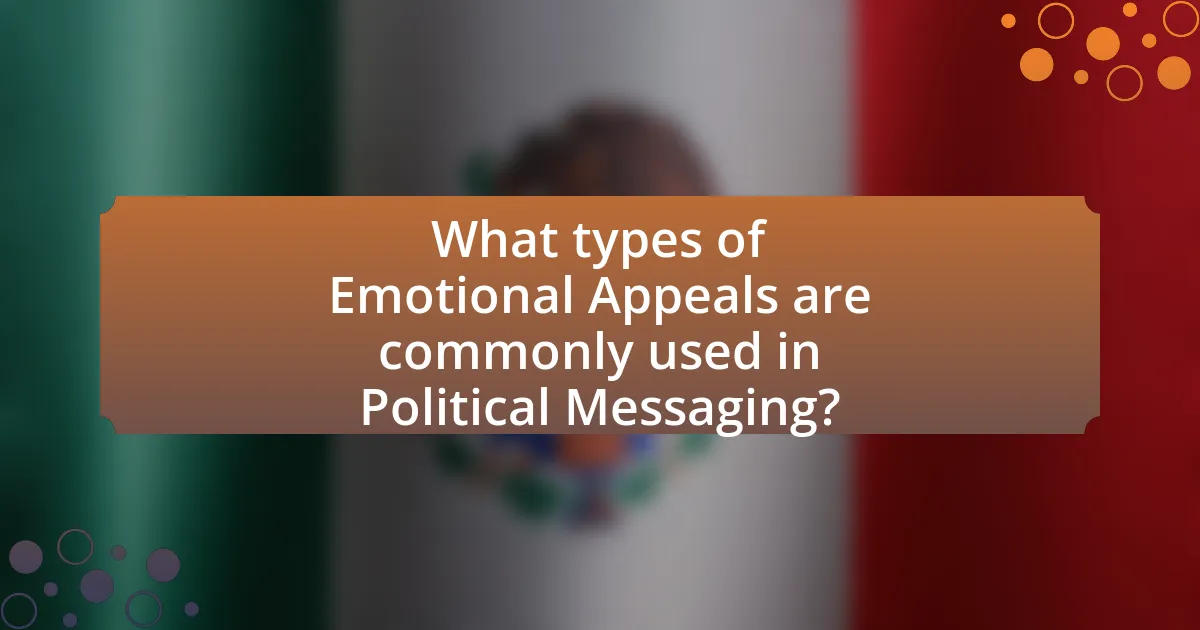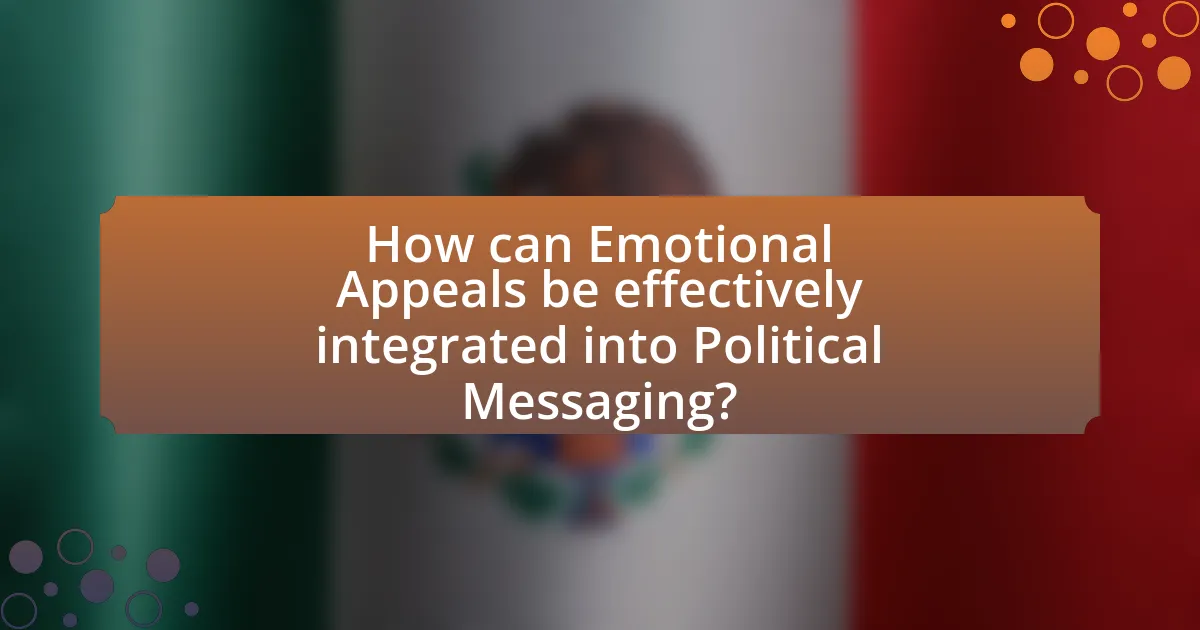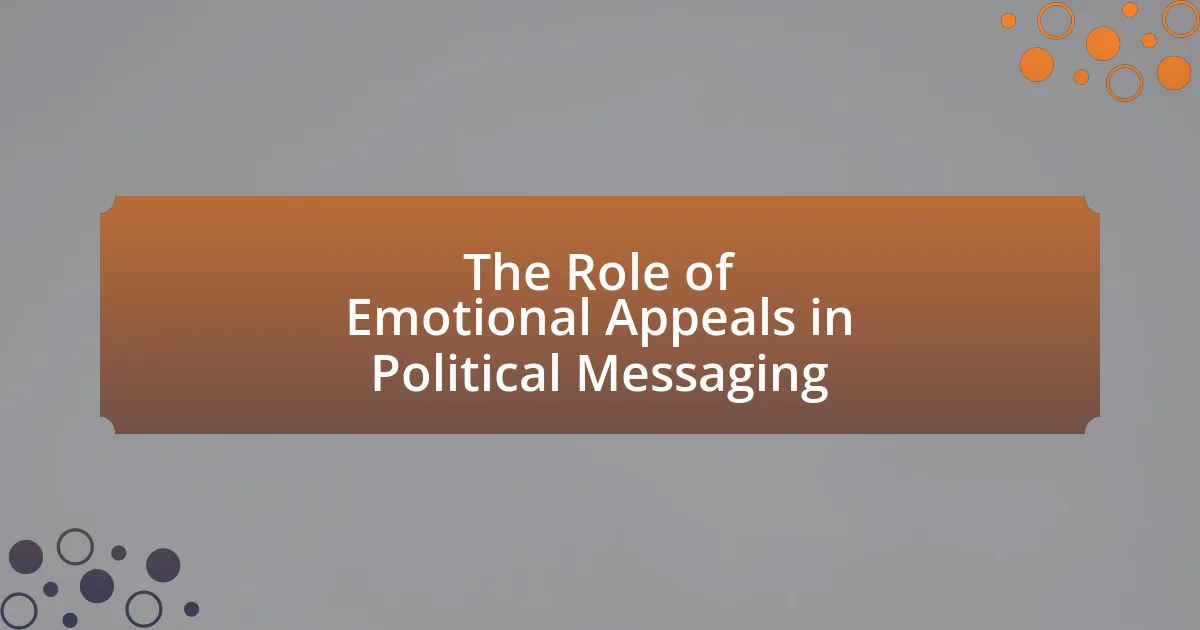The article examines the role of emotional appeals in political messaging, highlighting how these strategies leverage emotions such as fear, hope, and empathy to influence public opinion and voter behavior. It discusses the psychological mechanisms behind emotional appeals, their effectiveness compared to rational arguments, and their significance in shaping public discourse. Additionally, the article explores various types of emotional appeals, including fear-based and empathy-driven messages, and provides insights into best practices for integrating these appeals into political communication while addressing potential pitfalls and ethical considerations.

What are Emotional Appeals in Political Messaging?
Emotional appeals in political messaging are strategies that evoke strong feelings to influence public opinion and behavior. These appeals leverage emotions such as fear, hope, anger, and empathy to create a connection with the audience, making the message more persuasive. For instance, political campaigns often use imagery and narratives that resonate emotionally, as seen in Barack Obama’s 2008 campaign, which effectively utilized hope and change to mobilize voters. Research indicates that messages eliciting emotional responses can significantly enhance engagement and retention, demonstrating the effectiveness of emotional appeals in shaping political discourse.
How do Emotional Appeals influence voter behavior?
Emotional appeals significantly influence voter behavior by evoking feelings that can sway decision-making processes. Research indicates that emotions such as fear, hope, and anger can lead to increased engagement and mobilization among voters. For instance, a study by Brader (2006) found that emotional advertisements increased voter turnout by 10% compared to neutral messages. This demonstrates that when political messages resonate emotionally, they can effectively motivate individuals to participate in elections, thereby shaping overall voter behavior.
What psychological mechanisms underlie Emotional Appeals?
Emotional appeals are underpinned by psychological mechanisms such as affective reasoning, social identity theory, and the principle of emotional contagion. Affective reasoning suggests that individuals often make decisions based on their emotions rather than rational analysis, leading them to respond more favorably to messages that evoke strong feelings. Social identity theory posits that people are motivated to align with groups that reflect their values and emotions, making emotional appeals effective in reinforcing group cohesion and identity. Emotional contagion refers to the phenomenon where emotions are transferred from one individual to another, enhancing the persuasive power of messages that evoke empathy or shared feelings. These mechanisms demonstrate how emotional appeals can significantly influence attitudes and behaviors in political messaging.
How do Emotional Appeals differ from rational arguments?
Emotional appeals differ from rational arguments primarily in their reliance on feelings rather than logic. Emotional appeals aim to evoke strong feelings such as fear, joy, or anger to persuade an audience, while rational arguments focus on facts, statistics, and logical reasoning to support a claim. For instance, a political campaign may use emotional appeals by highlighting personal stories of hardship to connect with voters on a human level, whereas a rational argument would present data on economic performance to persuade voters based on logical analysis. This distinction is crucial in political messaging, as emotional appeals can create a more immediate and visceral connection with the audience, often leading to quicker and more impactful responses than rational arguments alone.
Why are Emotional Appeals important in political campaigns?
Emotional appeals are important in political campaigns because they effectively engage voters’ feelings, influencing their perceptions and decisions. Research indicates that emotions can drive voter behavior more than rational arguments, as emotional messages create a stronger connection between candidates and constituents. For instance, a study published in the journal “Political Psychology” found that emotionally charged advertisements significantly increased voter turnout compared to those that relied solely on factual information. This demonstrates that emotional appeals can enhance relatability and urgency, making them a crucial strategy in political messaging.
What role do Emotional Appeals play in shaping public opinion?
Emotional appeals significantly influence public opinion by eliciting strong feelings that can drive individuals to support or oppose specific issues. These appeals tap into emotions such as fear, anger, or compassion, which can lead to heightened engagement and mobilization among audiences. Research indicates that messages invoking emotional responses are more likely to be remembered and shared, thereby amplifying their impact on public discourse. For instance, a study published in the journal “Political Communication” found that emotionally charged political advertisements increased voter turnout by 20% compared to neutral messages. This demonstrates that emotional appeals are a powerful tool in shaping public perceptions and behaviors in the political arena.
How can Emotional Appeals enhance message retention?
Emotional appeals enhance message retention by creating a stronger connection between the audience and the content, leading to improved recall. Research indicates that emotionally charged messages activate the amygdala, a brain region involved in processing emotions, which in turn enhances memory consolidation. For instance, a study published in the journal “Cognition and Emotion” by scholars such as J. M. P. van der Linden et al. found that participants who were exposed to emotionally evocative content demonstrated significantly better retention of the information compared to those who received neutral messages. This evidence supports the notion that emotional engagement not only captures attention but also facilitates deeper cognitive processing, resulting in more effective communication in political messaging.

What types of Emotional Appeals are commonly used in Political Messaging?
Political messaging commonly employs three types of emotional appeals: fear, hope, and anger. Fear appeals are used to highlight potential threats or dangers, motivating voters to take action to avoid negative outcomes, as seen in campaigns that emphasize crime rates or economic instability. Hope appeals focus on positive visions for the future, inspiring voters to support candidates who promise change and improvement, exemplified by slogans like “Yes We Can” from Barack Obama’s 2008 campaign. Anger appeals tap into feelings of frustration or injustice, galvanizing support against perceived adversaries or systemic issues, which was notably effective in movements like the Tea Party. These emotional appeals are strategically utilized to influence voter behavior and decision-making in elections.
How do fear-based appeals affect political messaging?
Fear-based appeals significantly influence political messaging by heightening emotional responses and increasing voter engagement. These appeals often evoke anxiety or concern about potential threats, which can lead to a stronger alignment with the message being conveyed. Research indicates that fear can enhance the persuasiveness of political messages, as seen in studies like the one conducted by the University of California, which found that fear-inducing advertisements increased voter turnout by 10% compared to neutral messages. This demonstrates that when political campaigns effectively utilize fear-based appeals, they can mobilize support and shape public opinion more effectively.
What are the potential risks of using fear in political campaigns?
Using fear in political campaigns can lead to significant risks, including alienation of voters, desensitization to fear tactics, and potential backlash against the candidate. Alienation occurs when voters feel manipulated or overwhelmed by fear-based messaging, which can drive them away from the candidate. Research indicates that fear appeals can lead to desensitization, where repeated exposure diminishes the emotional impact, making future fear-based messages less effective. Additionally, backlash can occur if voters perceive the fear tactics as unethical or dishonest, resulting in a loss of trust and support. A study by the American Psychological Association found that fear-based messaging can polarize audiences, further complicating the political landscape.
How can fear-based appeals be effectively utilized?
Fear-based appeals can be effectively utilized by clearly presenting a credible threat that resonates with the audience’s values and concerns. This approach engages emotions, prompting individuals to take action to mitigate the perceived danger. Research indicates that fear appeals are most effective when they include specific, actionable steps that the audience can take to avoid the threat, thereby increasing the likelihood of a positive response. For instance, a study published in the Journal of Communication found that messages combining fear with efficacy information led to higher levels of engagement and behavioral intention among participants.
What role does empathy play in Emotional Appeals?
Empathy is crucial in emotional appeals as it fosters a connection between the communicator and the audience, enhancing the persuasive impact of the message. When individuals feel understood and emotionally resonated with, they are more likely to respond positively to the appeal. Research indicates that messages invoking empathy can significantly increase engagement and support; for instance, a study published in the Journal of Personality and Social Psychology found that empathetic messaging led to a 50% increase in willingness to support social causes. This demonstrates that empathy not only strengthens emotional appeals but also drives action and commitment from the audience.
How can empathy-driven messages resonate with voters?
Empathy-driven messages resonate with voters by creating a sense of connection and understanding between the candidate and the electorate. When political messages reflect genuine concern for voters’ experiences and emotions, they foster trust and relatability. Research indicates that voters are more likely to support candidates who demonstrate empathy, as it aligns with their values and needs. For example, a study published in the Journal of Politics found that candidates who effectively communicated empathy were perceived as more trustworthy and competent, leading to increased voter support. This demonstrates that empathy in messaging not only appeals to emotions but also translates into tangible electoral benefits.
What are examples of successful empathy-based campaigns?
Successful empathy-based campaigns include the “It’s On Us” initiative launched by the White House in 2014, which aimed to combat sexual assault on college campuses by fostering a sense of shared responsibility among students. This campaign effectively utilized personal stories and testimonials to evoke emotional responses, leading to increased awareness and engagement in prevention efforts. Another example is the “Love Has No Labels” campaign by the Ad Council, which promoted diversity and inclusion by showcasing love across different races, genders, and sexual orientations. This campaign successfully resonated with audiences, generating over 100 million views and sparking conversations about acceptance and empathy. Both campaigns demonstrate the power of emotional appeals in political messaging by connecting with individuals on a personal level, thereby driving social change.

How can Emotional Appeals be effectively integrated into Political Messaging?
Emotional appeals can be effectively integrated into political messaging by aligning the message with the audience’s values and experiences. This approach involves using storytelling techniques that evoke empathy, fear, or hope, thereby creating a personal connection with the audience. For instance, political campaigns that share personal stories of individuals affected by specific policies can resonate deeply, as evidenced by Barack Obama’s use of personal narratives during his 2008 campaign, which helped to humanize complex issues and foster a sense of community. Additionally, employing vivid imagery and emotionally charged language can enhance the impact of the message, making it more memorable and persuasive. Research indicates that messages that elicit strong emotional responses are more likely to be shared and discussed, amplifying their reach and effectiveness in influencing public opinion.
What strategies can political communicators use to craft Emotional Appeals?
Political communicators can craft emotional appeals by utilizing storytelling, evoking empathy, and leveraging social proof. Storytelling allows communicators to present relatable narratives that resonate with audiences, making complex political issues more accessible and emotionally engaging. For instance, personal stories of individuals affected by policy decisions can create a strong emotional connection, prompting audiences to feel compassion and urgency.
Evoking empathy involves highlighting shared human experiences and emotions, which can motivate individuals to support a cause or candidate. Research indicates that messages that trigger empathy can significantly increase engagement and support for political initiatives.
Leveraging social proof, such as testimonials or endorsements from respected figures, can enhance credibility and influence public perception. When audiences see others expressing strong emotional responses to a political message, they are more likely to align their feelings and actions with that sentiment.
These strategies are effective because they tap into the psychological mechanisms of human behavior, making political messages more impactful and memorable.
How can storytelling enhance Emotional Appeals in political messaging?
Storytelling enhances emotional appeals in political messaging by creating relatable narratives that resonate with the audience’s values and experiences. This technique allows politicians to connect on a personal level, making complex issues more understandable and emotionally engaging. For instance, research by the Stanford Graduate School of Business indicates that stories can increase information retention by up to 22 times compared to facts alone, demonstrating the power of narrative in influencing public perception and emotional response. By weaving personal anecdotes or community experiences into their messaging, politicians can evoke empathy, urgency, and a sense of shared identity, ultimately driving voter engagement and support.
What are the best practices for balancing emotion and logic in messaging?
The best practices for balancing emotion and logic in messaging involve integrating emotional appeals with factual evidence to create a compelling narrative. Effective messaging should begin with an emotional hook that resonates with the audience, followed by logical arguments supported by data or statistics to reinforce the message. For instance, a study by the Pew Research Center found that messages combining emotional and rational elements are more persuasive, as they engage both the heart and the mind of the audience. This dual approach not only captures attention but also builds credibility, making the message more relatable and trustworthy.
What are the potential pitfalls of using Emotional Appeals?
The potential pitfalls of using emotional appeals include the risk of manipulation, oversimplification of complex issues, and alienation of certain audiences. Emotional appeals can lead to manipulation when they exploit feelings rather than presenting factual information, which can mislead the audience. For instance, studies show that emotionally charged messages can overshadow rational arguments, resulting in decisions based on feelings rather than facts. Additionally, emotional appeals often oversimplify complex political issues, reducing nuanced discussions to binary choices, which can misinform voters. Furthermore, targeting specific emotions may alienate segments of the audience who do not resonate with those feelings, potentially leading to polarization. Research indicates that emotional messaging can create divisions, as seen in political campaigns that heavily rely on fear or anger, which can ultimately undermine democratic discourse.
How can over-reliance on Emotional Appeals backfire?
Over-reliance on emotional appeals can backfire by alienating audiences who prioritize rational arguments over emotional manipulation. When political messaging excessively relies on emotions, it risks appearing insincere or manipulative, leading to skepticism among voters. Research indicates that voters often respond negatively to messages perceived as overly emotional, as seen in a study by the Pew Research Center, which found that 63% of respondents preferred fact-based arguments in political discourse. This skepticism can diminish trust in the messenger and reduce the effectiveness of the overall campaign.
What ethical considerations should be taken into account?
Ethical considerations in the role of emotional appeals in political messaging include the potential for manipulation, the accuracy of information presented, and the impact on public trust. Manipulation occurs when emotional appeals are used to distort facts or exploit vulnerabilities, leading to decisions based on emotions rather than rational analysis. Accurate information is crucial, as misleading or false claims can undermine democratic processes and informed decision-making. Additionally, the use of emotional appeals can erode public trust in political institutions if perceived as insincere or deceptive, as evidenced by studies showing that voters become skeptical of messages that prioritize emotional resonance over factual integrity.
What practical tips can enhance the effectiveness of Emotional Appeals in Political Messaging?
To enhance the effectiveness of emotional appeals in political messaging, communicators should focus on authenticity, storytelling, and audience connection. Authenticity ensures that the emotional message resonates with the audience’s values and beliefs, making it more credible. Research indicates that messages perceived as genuine are more likely to elicit emotional responses (Briñol et al., 2012). Storytelling engages audiences by creating relatable narratives that evoke empathy and personal connection, which can significantly increase the impact of the message. A study by Green and Brock (2000) found that narratives can transport individuals, leading to stronger emotional engagement. Lastly, understanding the audience’s demographics and emotional triggers allows for tailored messaging that speaks directly to their experiences and concerns, thereby enhancing the overall effectiveness of the emotional appeal.
